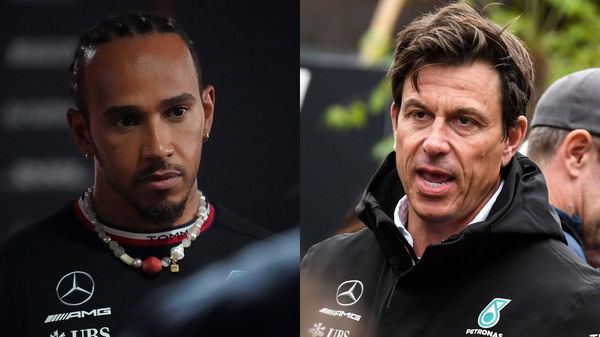
via Imago
Image Courtesy: Imago | L: Lewis Hamilton, R: Toto Wolff

via Imago
Image Courtesy: Imago | L: Lewis Hamilton, R: Toto Wolff
Lewis Hamilton spent a phenomenal 12-year stint with Mercedes and won an incredible seven world championships, but he’s recently suffered setbacks, most notably during the Australian Grand Prix. Despite his remarkable career, he was DNFed in the race and was eliminated from the 11th round in the qualification stage. The Brit had earlier expressed concerns about the W15, which remained unresolved. Toto Wolff also addressed the issues of a botched setup modification in the car.
Following the race, Hamilton’s frustration was evident in his interview with Sky Sports. More recently, during the Sky Sports F1 podcast, host Matt Baker revealed the Brit’s disappointment with Mercedes, highlighting them as unreliable. Hamilton stressed the complexity of FIA regulations, suggesting their complex nature, and hit Mercedes for their inability to enforce them on the grid effectively. This sheds light on Mercedes’ failure to keep pace with the evolving landscape of F1.
ADVERTISEMENT
Article continues below this ad
Lewis Hamilton Blasts Mercedes admist FIA complex regulations
The seven-time world champion initially qualified in 9th position on the grid, but his performance deteriorated, leading to a disappointing Did Not Finish (DNF) outcome. Mercedes driver described it as his worst race. In a Sky Sports F1 podcast, Matt Baker disclosed details from his interview with Hamilton, recounting his question to the Brit, “I asked him question about glad to be back in Japan in springtime. He said yes absolutely he loves this place plus Tokyo is one of the best city for him on the planet.”
When Matt further questioned Hamilton on the issue, the Brit expressed, “Well the first rule of all the season isn’t over we haven’t lasted it yet which is absolutely true I mean good luck with them they have not mastered it yet but we haven’t been surprised. Secondly, there are very complicated rules to master. Yeah they’ve not mastered their particularly not reliable”
Through his statements, it becomes evident that Mercedes is grappling with challenges, particularly in adhering to FIA regulations. Hamilton perceives these regulations as intricate and challenging to navigate on the grid. However, the Brit has performed better in the upcoming race as he has found an ideal spot with his car.
Lewis Hamilton’s garage experimentation
The seven-time world champion at Mercedes has faced significant challenges since the ground effect era began. Despite their optimism for the 2024 season, the Silver Arrows team had finished, securing 4th and 5th positions at the Japanese Grand Prix. Hamilton found himself reminiscing about the 2022 season, where he ran most set-up experiments to extract performance from the W13. However, his recent statement suggests that he has found an ideal spot with his W15, evident from his statements after the first practice session in Japan.
ADVERTISEMENT
Article continues below this ad

via Reuters
Formula One F1 – Bahrain Grand Prix – Bahrain International Circuit, Sakhir, Bahrain – March 2, 2024 Mercedes’ Lewis Hamilton ahead of the Bahrain Grand Prix REUTERS/Hamad I Mohammed
Back in 2022, when George Russell outperformed the Brit, it appeared that Hamilton had finally met his perfect match in his teammate. However, it later emerged that the 7x champion had been running many experiments to fine-tune the setup of the W13, often resulting in the wrong setup and a slower car on race day. With the introduction of the zero-pod concept in 2023, Hamilton’s instincts were proved as he outpaced his teammate, winning by a significant margin of 59 points in the championship.
With Mercedes dashed the zero-side post concept following a promising pre-season test for the Brackley team, Hamilton again indulges in garage experimentation. However, after the first practice session in Japan, the Brit appears to have regained his confidence in his car’s setup.
ADVERTISEMENT
Article continues below this ad
Do you think the 7x champion will go undercover again during the Japanese GP to explore Tokyo City? Is 2022 reminiscent of the present performance of Lewis Hamilton? Share your thoughts in the comments
Read More: Why Is Lewis Hamilton So Slow in 2024?
ADVERTISEMENT
ADVERTISEMENT
ADVERTISEMENT
ADVERTISEMENT
